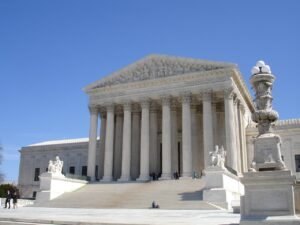
DEEP THOUGHTS! (Photo By Tom Williams – Pool/Getty Images)
Today’s “You Tried It” award goes to Florida Senator Rick Scott for his proposed amendment to the 2002 Help America Vote Act, which he’s dubbed the Verifiable, Orderly, & Timely Election Results (VOTER) Act.
Emphasis on the “timely.”
Because if the Florida Republican was actually able to ram through a massive overhaul of the nation’s election laws 40 days before the polls open and while voting is already underway, the result would be less “verifiable” and “orderly” than outright pandemonium.
Most outrageously, Scott’s law would force states to stop counting votes “24 hours after the conclusion of voting on the date of the election.” Even in a normal year, it can take several days to count the votes. And this isn’t a normal year.
Some 80 million voters may cast their ballots by mail this year, as compared to 57 million in 2016. Most states aren’t even opening envelopes to verify absentee ballots until election day, a process that can take several minutes per ballot. The impossibility of meeting an arbitrary 24-hour cutoff would necessarily disenfranchise millions of voters. But it would be timely!
Why the hurry, when the 1887 Electoral Count Act gives states 41 days after the election to name electors to the electoral college? Surely it has nothing to do with the expected overrepresentation of members of Senator Scott’s own party at in-person polling places, while Democrats have concentrated on racking up votes by mail-in ballot. Perish the very thought.
And speaking of mail-in votes, Scott’s proposed legislation would make it illegal to count those votes until election day, in contravention of legislation he himself signed as Florida’s governor allowing absentee ballots to be processed and readied for tabulation before election day, and forcing the 16 states which count votes as they come in to delay their counts.
Scott would cut off absentee ballot requests 21 days before the election, and throw out any votes received after election day, overriding state laws which count votes postmarked on election day itself and received within a few days, as well as laws allowing voters to “cure” defective ballots. (Not that it would matter, since Scott demands an official tally within 24 hours.)
He’d make so called “ballot harvesting,” the process of collecting ballots en masse and delivering them to the elections office a crime punishable by up to one year in jail.
And he’d further gum up the works by imposing a responsibility on every precinct to report the total of in-person and absentee votes received within one hour of the polls closing.
“We can’t wait weeks or months to find out the results of this election or any election in our future – a scenario made all the more likely by the Democrats’ push to change laws late in the game and eliminate standards that protect against fraud,” Scott said. “The VOTER Act will create uniform standards for voting-by-mail, provide important protections against fraud, and make sure we have a timely federal election result. We need to pass this bill now to ensure a smooth and secure election.”
Yep, this is a very serious proposal. Or … it’s a publicity stunt that has no chance of passing the Senate, much less the House, and is simply designed to cast doubt on a careful election tally that takes several days to tabulate and may show some races shifting from red to blue as all the votes are counted.
Probably the second one, TBH.
Verifiable, Orderly, & Timely Election Results (VOTER) Act
Elizabeth Dye lives in Baltimore where she writes about law and politics.














 Kathryn Rubino is a Senior Editor at Above the Law, and host of
Kathryn Rubino is a Senior Editor at Above the Law, and host of 


